Paradise. Elusive, serene, perfect travel paradise. That’s where millions of people want to go. The image that comes to mind is one of empty beaches, crystal clear water and fancy bungalows hanging on a cliff or hovering over a tranquil lagoon.
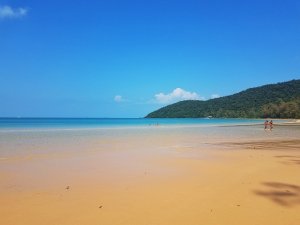
These illusions are misplaced. Many prospective travelers dismiss the dream destination on the basis of the absurd prices of those fancy bungalows.
The reality of paradise is different.
Reaching Travel Paradise
I found the perfect travel paradise. The complete package.
Getting there, however, is no easy task.
Day One:
It started with arriving in the capital city of this Southeast Asian country. From there, a bus – a hot bus – was taken to a near-coastal town. All the windows were open allowing some air flow, though this meant the dust and fumes in the Southeast Asian air were now in our lungs. The ride, only about 100 miles, takes about five hours on a bumpy road that alternates between pavement, formerly-paved potholes and dirt.
For clarification, anything referred to here as a “bus” is a small van packed edge-to-edge, front-to-back with people, luggage and whatever random stuff the drivers decide to transport.
An overnight stay in the near-coastal town was needed after the hellish bus ride. However, as far as buses in Southeast Asia go, this one really wasn’t too bad. Following an afternoon of wandering and eating, another bus is on the agenda for the next morning, which means I’m one step closer to paradise.
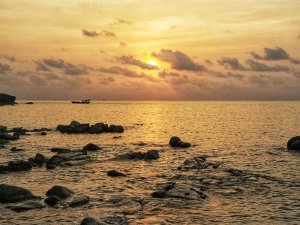
Day Two:
This second bus is much shorter and should only take 2-3 hours. But I knew better. In Southeast Asia, never trust bus timetables. And there is absolutely no reason to trust or put any stock whatsoever in Google Maps estimates. Travelers to Southeast Asia must quickly learn that they travel on local time. It’s best to accept it and relax.
After four-and-a-half hours of driving through some very humbling villages, we reach the coastal city with a few hours to spare before the ferry departs. But, again, reaching paradise is rarely this simple.
The bus that is supposed to drop its dozen passengers off near the ferry terminus stops in the middle of the city. No big deal. No one said traveling to paradise is easy, and it’s always best to seize opportunities to be healthy when traveling. After walking a little over a mile in incredible heat, the ferry is in sight.
Checking in with the ferry was quick, so we found a place nearby with air conditioning and frozen drinks – the perfect spot to waste some money and recuperate.
When it came time to board the ferry, we were packed like sardines, about seventy-five passengers – inside a large speedboat. It was hot as hell, and it felt like the beginning of a travel nightmare. I could see it then: “Boat Full of Tourists Capsizes in Southeast Asia!”
The boat was perfectly safe, and I knew this, but the rickety operation does cause the mind to wander.
About a mile off shore, the boat stopped in the middle of the ocean. Something broke. Crew members were diving off the top and swimming out to pick up some unidentifiable debris floating in the water.
After a fifteen-minute delay, we were off again, no wiser to whatever mechanical mishap occurred. Another thirty minutes later, we reached a tiny jungle island. The speedboat made three stops on the island, each time unloading a few passengers, before it was finally our turn to disembark.

We stepped onto a small, rickety pier. How this wobbly pier was standing is beyond me. Nonetheless, the voyage was complete.
After eleven hours on jam-packed buses, losing a few liters of sweat, plenty of clueless waiting around, then an hour on a crowded boat… Finally. Paradise.
It took the better part of two days to reach tropical paradise from about 150 miles away. Adding flights into the country would increase the voyage to about three days, but thankfully, I was already in Southeast Asia. This isn’t the rough way to do it, just the standard route taken by most travelers.
There are easier ways to reach paradise. Some places – Bali, Phuket, most of the Caribbean islands – have international airports. In this Southeast Asian country, it would cost substantially more to make the journey easier and faster. After doubling your costs, you’d be lucky if it saved one day of travel.
Reaching the perfect travel paradise requires determination, tolerance and a lot of patience.
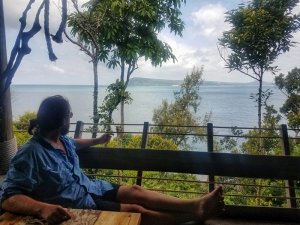
Money isn’t the reason you stop searching for that dream. The perfect travel utopia I found is quite cheap, but true paradise is a place unspoiled. In order for one of Earth’s perfect settings to remain just so, a certain lack of development must remain in place. And that usually involves a long journey.
The Reality of Paradise
The perfect travel paradise doesn’t have rows of luxurious bungalows and five-star restaurants. Getaways with all the bells and whistles are great – who wouldn’t want to spend a week soaking up the sun in a cliffside infinity pool with tropical perfection down below? But authentic paradise is just that – authentic. Not to mention that infinity pool comes with a hefty price tag.
Imagine that pristine scene, a little slice of heaven. Now make it oppressively hot and take away all of the air conditioning. Forget about cell phone reception and functioning WiFi. There are no ATMs, so bring plenty of cash. Finally, throw in the occasional rodent and plenty – and, I mean PLENTY – of insects biting you at every opportunity.
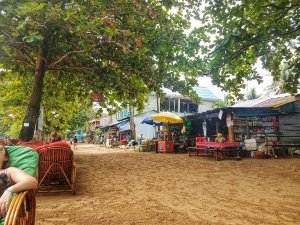
That part sounds miserable. In practice, it amounts to nothing more than a little bit of frustration. These frustrations aren’t a requirement, but the flaws of a perfect travel paradise are what make it special. They are a sign of authenticity.
The reality of paradise often comes in this form. In reaching an elusive tropical wonderland, sacrifices must be made. My experience was no different.
This tiny jungle island in the tropics is an off-the-grid locale. Five-star suites were nowhere in sight. Using the toilet meant squatting and no flushing. Any and all electricity is sourced from generators. There were no post offices or banks. Whatever purchases need to be made – accommodation, food, drinks, everything – must be paid for in cash, which has to considered before reaching the island.
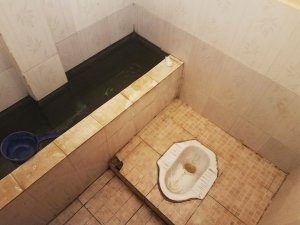

Travelers must prepare for the sun, mosquitos, sandflies (see above photo) and more. In the jungle center of the island, there are deadly snakes, and the nearest doctor is back on the mainland. Ferries only run a few times a day, and most of the small, wooden boats don’t make that trip.
You sacrifice the comfort of air conditioning, but there are no power lines to destroy a view. There are no cars, noisy markets nor smothering layers of smog. At night there are no street lights, only moonlight, stars and tiki torches.
And it was worth every second.
Those drawbacks are enough to keep most travelers inside the all-inclusive resorts, but the surrounding natural perfection makes up for any moment of discomfort.
Finding Your Paradise
Illusions of tropical paradise excite millions of people. For years, we’ve seen the movies, the paintings, read the articles and have all had that screensaver of the tiny island with crystal clear water, palm trees and empty beaches.
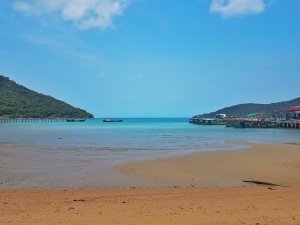
I love encouraging people to travel, but finding your own paradise is more important. To help maintain the natural state of the perfect travel paradise I found, I will not explicitly state the name of the island, only saying that it is in Southeast Asia. It’s days are surely numbered as is, but I do not want to contribute to a speedier demise.
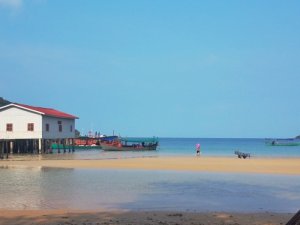
That island represents something. It’s a place we’re all trying to find before our neighbors get their first. How do we get there? Where is it?!
There is no singular paradise. There are thousands of pristine islands, remote mountain villages and desert oases waiting to be overtaken by tourism. I’ve found it. In truth, it does not require a team of explorers and navigators to find paradise. But it’s no picnic, either.
For years, it was Bali. Then it was Phuket. Then Phi Phi. Bora Bora. Tahiti. These are the places we envision when paradise comes to mind.
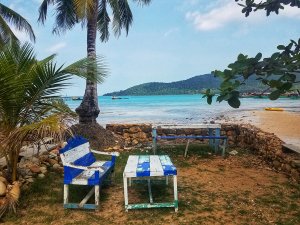
Paradise is not luxury. It is not a specific place. And it isn’t a particular climate. It is a state of mind. I’m not a hippie, and I don’t mean to sound like one, but the reality of finding the perfect travel paradise is up to you.
Leave a Reply
You must be logged in to post a comment.